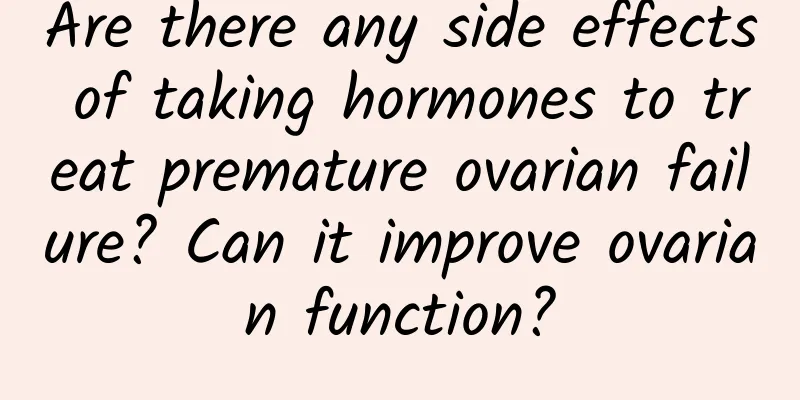Are there any side effects of taking hormones to treat premature ovarian failure? Can it improve ovarian function?

|
Author: Teng Xiuxiang, Chief Physician, Beijing Hospital of Traditional Chinese Medicine, Capital Medical University Reviewer: Ruan Xiangyan, Chief Physician, Beijing Obstetrics and Gynecology Hospital, Capital Medical University Many female friends, after being diagnosed with premature ovarian failure or premature ovarian insufficiency, will choose hormone replacement therapy, which is commonly known as HRT treatment. So, how long should estrogen be supplemented and should it be taken continuously? This is a question that many female patients are concerned about. 1. How long does hormone replacement therapy for premature ovarian failure need to be continued? Premature ovarian failure and premature ovarian insufficiency both occur in women before the age of 40. After ovarian decline or failure, the ovaries cannot ovulate normally, and the ovaries cannot secrete the estrogen needed by the human body normally, which will cause menstrual abnormalities, such as changes in the cycle, shortened menstrual period, and less menstrual flow, accompanied by hot flashes, sweating, irritability and other symptoms similar to perimenopausal syndrome. Hormone replacement therapy is to artificially supplement estrogen and progesterone exogenously to relieve the symptoms and diseases associated with low estrogen caused by the body's inability to produce estrogen. Clinically, it is recommended that women with premature ovarian failure supplement 2 mg of estrogen per day. When should estrogen be taken? Guidelines and consensus indicate that it should be taken until the normal menopause age for women. The normal menopause age for women is generally between 45 and 55 years old. Therefore, hormone replacement therapy for patients with premature ovarian failure should continue until about 50 years old. After that, it is changed to menopausal hormone therapy, also called MHT, which only requires 1 mg of estrogen per day. If premature ovarian failure occurs at around 25 years old, it seems that it will take about 25 years of estrogen and progesterone supplementation. Many patients with premature ovarian failure begin to worry whether long-term estrogen and progesterone supplementation will increase the incidence of breast cancer and endometrial cancer? Will it lead to drug dependence? Can hormone supplementation improve ovarian function? 2. Will long-term estrogen supplementation increase the risk of endometrial cancer and breast cancer? The current hormone replacement therapy is a cyclical treatment that supplements estrogen and progesterone. In the first half of the medication, estrogen is simply supplemented; in the second half of the medication, natural or near-natural progesterone is added while estrogen is supplemented. In this way, the risk of endometrial cancer and breast cancer generally does not increase. If only estrogen is taken alone, the risk of endometrial cancer will increase. 3. Will long-term estrogen supplementation cause dependence? In fact, it’s not really a matter of dependence. Under normal circumstances, the ovaries secrete estrogen and progesterone, which are already present in the human body. When the ovarian function declines or even fails, the ovaries no longer secrete estrogen and progesterone or secrete less, and the body is deficient in estrogen and progesterone. If estrogen and progesterone are deficient, estrogen and progesterone can be supplemented. After the hormone is supplemented, the endometrium will grow, menstruation will occur, and the symptoms related to hormone deficiency will be improved, and there will be no problem of drug dependence. 4. Will hormone replacement therapy improve ovarian function? Does hormone replacement therapy restore ovarian function? Not necessarily. In clinical practice, for many patients, the FSH (follicle-stimulating hormone) value does not decrease after hormone replacement therapy, and remains greater than 40IU/L, and there is even no obvious downward trend compared with the past. This situation does exist. Some patients will stimulate the development of some remaining follicles after hormone replacement therapy, and some will see a decrease in FSH values, an increase in estrogen levels, and follicle development. In a sense, this means that the ovarian function has responded and improved. In general, hormone replacement therapy is to artificially supplement the estrogen and progesterone that the human body lacks. Estrogen is very important for women and is related to their health and beauty. |
>>: YouGov: Millennials are the loneliest generation
Recommend
How long does it take to get your first menstrual period after medical abortion?
When a woman becomes pregnant unexpectedly, she w...
Can I use an electric fan during confinement?
Can I use an electric fan during the confinement ...
Does white nails in pregnant women indicate iron deficiency anemia?
White nails in pregnant women may be a sign of ir...
What are the reasons why menstruation is delayed for 10 days?
Nowadays, many women have gynecological diseases,...
During which 7 periods women must replenish blood
Women will have many opportunities to "bleed...
Is bloating a symptom of pregnancy?
Some people define these abdominal symptoms as pr...
Can I eat lettuce during menstruation?
Many women experience dysmenorrhea during menstru...
What to do if you suffer from lumbar muscle strain during breastfeeding?
During the breastfeeding period, mothers must lie...
How to warm up before plank support? How to practice plank support in the early stage
Plank is a muscle training method similar to push...
What is the difference between sorghum wine and white wine? What does sorghum wine taste like?
As the name suggests, sorghum wine is a liquor ma...
How to get rid of athlete's foot, sweat and foot odor
Athlete's foot, sweaty feet and smelly feet a...
What should you do when thyroid nodules are "harmful" to you?
Author: Yang Xiaorong Shanghai Pudong New Area Zh...
Bleeding in biochemical pregnancy
We all know that women have a lot of knowledge ab...
Can I use a test strip to detect pregnancy after 8 days of sex?
Having a baby is a big event in every family. Man...
Can I wash my hands with cold water when I get frostbite? What should I do if I get frostbite every year?
Winter is bitterly cold in both the south and the...









